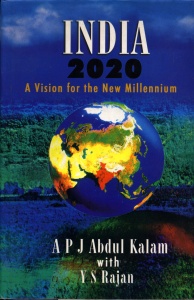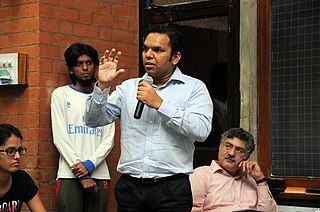Related Research Articles

Avul Pakir Jainulabdeen Abdul KalamBR was an Indian aerospace scientist and statesman who served as the 11th president of India from 2002 to 2007. He was born and raised in Rameswaram, Tamil Nadu and studied physics and aerospace engineering. He spent the next four decades as a scientist and science administrator, mainly at the Defence Research and Development Organisation (DRDO) and Indian Space Research Organisation (ISRO) and was intimately involved in India's civilian space programme and military missile development efforts. He thus came to be known as the Missile Man of India for his work on the development of ballistic missile and launch vehicle technology. He also played a pivotal organisational, technical, and political role in India's Pokhran-II nuclear tests in 1998, the first since the original nuclear test by India in 1974.
The standard of living in India varies from state to state. In 2021, extreme poverty was fully eradicated to as low as 0.8% and India is no longer the nation with the largest population under poverty.

Model Engineering College or MEC is a government cost-sharing technical institute and research centre in Thrikkakara, Kochi, Kerala, India. It was established by the Institute of Human Resources Development (IHRD), an autonomous agency under the Government of Kerala, in 1989. It is affiliated to the APJ Abdul Kalam Technological University (KTU) since 2015.

Kamal Nath is an Indian politician who served as the 18th Chief Minister of Madhya Pradesh for approximately 15 months and resigned after a political crisis. He was the Leader of the Opposition in the Madhya Pradesh Legislative Assembly from March 2020 to April 2022.

India 2020: A Vision for the New Millennium is a book, written by the 11th President of India A P J Abdul Kalam and Y. S. Rajan. The book was written by the duo in the year 1998, before Kalam's tenure as President. It talks about Kalam's prediction for India's future and for developing India.

Jairam Ramesh is an Indian politician belonging to Indian National Congress. He is a Member of Parliament representing Karnataka state in the Rajya Sabha. In July 2011, Jairam was elevated to the Union Council of Ministers of India and appointed Minister of Rural Development and Minister of the new Ministry of Drinking Water and Sanitation. However, in the cabinet reshuffle in October 2012, he was divested of the portfolio of Ministry of Drinking Water and Sanitation. He was previously the Indian Minister of State at the Ministry of Environment and Forests from May 2009 to July 2011.
Mahatma Gandhi National Rural Employment Guarantee Act 2005 or MGNREGA, earlier known as the National Rural Employment Guarantee Act or NREGA, is an Indian social welfare measure that aims to guarantee the 'right to work'. This act was passed on 23 August 2005 and was implemented in February 2006 under the UPA government of Prime Minister Manmohan Singh following tabling of the bill in parliament by the Minister for Rural Development Raghuvansh Prasad Singh.

Jawaharlal Nehru National Urban Renewal Mission (JNNURM) was a massive city-modernization scheme launched by the Government of India under the Ministry of Urban Development. It envisaged a total investment of over $20 billion over seven years. It is named after Pt. Jawaharlal Nehru, the first Prime Minister of India. The aim is to encourage reforms and fast track planned development of identified cities. Focus is to be on efficiency in urban infrastructure and service delivery mechanisms, community participation, and accountability of ULBs/ Parastatal agencies towards citizens.

The Education and Research Network (ERNET) is an autonomous scientific society of the Ministry of Electronics and Information Technology, Government of India. ERNET has made a significant contribution to the emergence of networking in the country. It practically brought the Internet to India and has built up national capabilities in the area of net-working, especially in protocol software engineering. It is the first internet service in india. It has not only succeeded in building a large network that provides various facilities to the intellectual segment of Indian society—the research and education community, it has over the years become a trendsetter in the field of networking.

S. M. Raju is a civil servant working for Bihar Government.
The Centre for India & Global Business is a research centre that was launched in March 2009 as part of Cambridge Judge Business School at the University of Cambridge, England, to support the university's growing engagement with India.

The Government Engineering College, Barton Hill, Thiruvananthapuram, was founded by the Government of Kerala in August 1999 and provides technical education under APJ Abdul Kalam Technological University. The institution is located in Barton Hill, which is two kilometres (1.2 mi) from the city centre in Trivandrum.
A State Wide Area Network (SWAN) is one of the core infrastructure components under the National e-Governance Plan of the Government of India. The main purpose of this network is to create a dedicated Closed User Group (CUG) network and provide a secured and high speed connectivity for Government functioning and connecting State Headquarters, District Headquarters, Blocks Headquarters. The SWAN project, which forms a strategic component of the National eGovernance Plan, was approved in March 2005.

Target 3 Billion is a book by the former President of India, A. P. J. Abdul Kalam, and Srijan Pal Singh. The book highlights the issues prevailing in rural India and suggests measures to improve standards of living. It focuses on the inclusive development project called PURA. The book plans to improve the standard of living amongst the poor rural population through voluntary campaigns such as community's participation and entrepreneurship.
Unified settlement planning (USP) is the component of regional planning where a unified approach is applied for a region's overall development. The USP approach is most often associated with urban planning practices in India.
The Government of India has initiated several National Missions in order to achieve individual goals that together ensure the wellbeing of its citizens.

Srijan Pal Singh is an Indian author, public speaker and social entrepreneur. He was born and raised in Lucknow, Uttar Pradesh.
National Heritage City Development and Augmentation Yojana (HRIDAY) was launched on 21 January 2015 with the aim of bringing together urban planning, economic growth and heritage conservation in an inclusive manner to preserve the heritage character of each Heritage City.

The Sagarmala Programme is an initiative by the Government of India to enhance the performance of the country's logistics sector. The programme envisages unlocking the potential of waterways and the coastline to minimize infrastructural investments required to meet these targets.
National Action Plan for Climate Change (NAPCC) is a Government of India's programme launched in 2008 to mitigate and adapt to the adverse impact of climate change. The action plan is designed and published under the guidance of Prime Minister’s Council on Climate Change (PMCCC). The 8 sub-missions aimed at fulfilling India's developmental objectives with focus on reducing emission intensity of its economy. The plan will rely on the support from the developed countries with the prime focus of keeping its carbon emissions below the developed economies at any point of time. The 8 missions under NAPCC are as follows:
References
- ↑ "Energy Self-Sufficient Talukas-A Solution to National Energy Crisis". Economic and Political Weekly. Economic and Political Weekly, Vol - XXX No. 51, 23 December 1995. 30 (51): 7–8. 5 June 2015.
- ↑ "Talukas can provide critical mass for India's sustainable development" (PDF). CURRENT SCIENCE, VOL. 82, NO. 6, 25 MARCH 2002.
- ↑ "Arthapedia". Arthapedia. Retrieved 14 September 2019.
- ↑ "Focus on providing urban amenities in rural India: APJ Kalam". The Economic Times.
- ↑ "Jairam Ramesh criticises APJ Abdul Kalam's PURA, launches his own version – India – DNA". Daily News and Analysis. 24 February 2012. Retrieved 4 October 2012.
- ↑ Devika Banerji, ET Bureau 11 Oct 2011, 05.12am IST (11 October 2011). "Provision of Urban amenities in Rural Areas might be extended to 2,000 new towns identified by 2011 Census". The Economic Times. Retrieved 4 October 2012.
{{cite web}}: CS1 maint: multiple names: authors list (link) CS1 maint: numeric names: authors list (link) - ↑ "MGNREGA scheme: 61 cases of under-payment of wages". The Economic Times. Press Trust of India. 8 December 2011. Retrieved 4 October 2012.